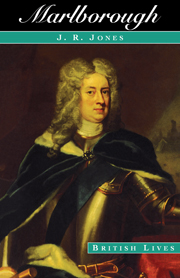Summary
Marlborough's earliest biographers were concerned to vindicate his reputation from the libels of hostile politicians and journalists. Both Francis Hare, whose Life and Glorious History appeared in 1705, and Thomas Lediard, who published a full Life in 1736, had served Marlborough personally, Hare as his chaplain, Lediard as an attache during his mission to Altranstadt. The latter based his work on wide manuscript materials and so has served as a quarry for later historians. This is also the case with William Coxe's Memoirs of John, Duke of Marlborough (1818–19) and the relevant portions of Onno Klopp's Der Fall des Hauses Stuart (Vienna, 1880–5). The latter is historiographically interesting because it reflects the ambivalence of contemporary Habsburg attitudes to Marlborough – unease at their unfortunately unavoidable dependence on him and predominantly Protestant allies, disgust at his betrayal of legitimist principles in 1688 and social contempt for an upstart who saw himself as the equal of hereditary princes.
In the second half of the eighteenth century three Scottish exponents of the new Toryism produced new criticisms of Marlborough. David Hume in leading the rehabilitation of the Stuarts excoriated his behaviour in 1688. Sir John Dalrymple and James Macpherson published documents from the French and Jacobite archives compromising him as a traitor after as well as in 1688. But it was the classical Whig historians of the nineteenth century who set out with effect to demolish his reputation. First Henry Hallam presented a ferocious indictment on moral grounds in his History (1827).
- Type
- Chapter
- Information
- Marlborough , pp. 1 - 9Publisher: Cambridge University PressPrint publication year: 1993

